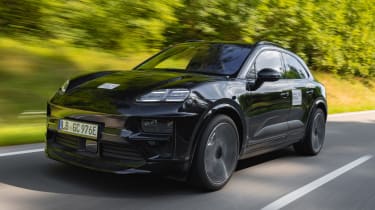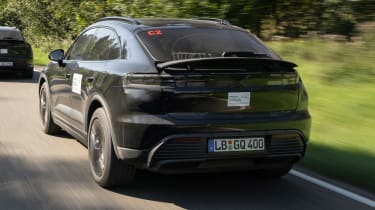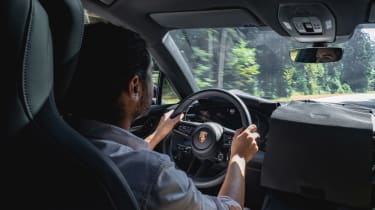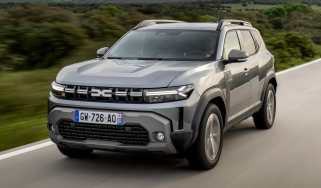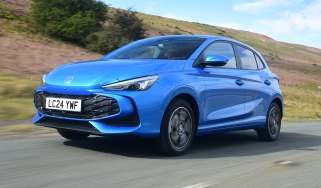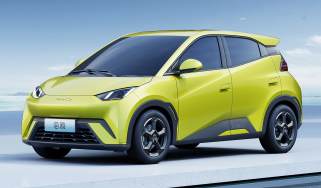New Porsche Macan EV prototype review
We get a first taste of the new all-electric Porsche Macan SUV
Verdict
Our final verdict will have to wait until we drive a full-production model, but on first impressions, the all-electric Porsche Macan will appeal just as much as the petrol-powered model that came before. It drives extremely well, is superbly built, and has all the ingredients to be another smash hit.
Porsche has made the audacious decision to replace its popular mid-size Macan SUV with a sole all-electric model, and we’re some of the first outside the company to try it – a few months before its official reveal.
Let’s not beat around the bush, the new Macan EV has a colossal job to do. Not only does it need to match the wild success of the petrol model, but it also has to live in the shadow of the Taycan, Porsche’s first electric car and benchmark for every high-end EV since.
Some technical details first. The new Macan debuts a brand new architecture for the brand, which has been co-developed with Audi. Called PPE, this platform will also feature under the new Q6 e-tron, but Porsche is adamant that from a very early stage it had the ability to tailor almost every element to its needs and requirements, splitting from Audi early on in the development process.
More reviews
The PPE platform supports single and dual-motor powertrains, but Porsche will only offer the latter, matched to a battery pack of around 100kWh. Porsche’s 800-volt electrical system underpins its electric hardware, allowing for up to 270kW DC fast charging, while quoting an estimated range of over 310 miles. Good, but not class-leading.
Porsche will offer two derivatives at launch, a standard Macan and the high performance Macan Turbo. For now, it has only revealed rough figures for the flagship, with figures of around 600bhp, plus over 1000Nm of torque. Specific numbers for the base Macan will be announced later, but from our time with it on the road, we suspect it’s good for around 300-350bhp.
Entry cars run on a combination of steel coil springs and PASM adaptive dampers (passive dampers will be available later), but it’s the Turbo model that shows off the high-end hardware. As well as being more powerful than the base car, the larger rear-mounted motor is paired to an electronically-controlled limited-slip differential.
It also runs an air-suspension system with its own set of adaptive dampers, and regardless of whether the car is coil or air sprung, new Macans run Porsche’s latest twin-valve PASM setup also used on the recently upgraded Cayenne – as well as the forthcoming Panamera. Rear-wheel steering is optional, but Porsche has stopped short of offering an active anti-roll bar system, despite a proposed weight of around 2,200kg.
Physically, the new Macan is quite hard to place, as it’s bigger than it looks in pictures. The design is fairly typical of a modern Porsche, with visual elements derived from the Taycan applied to this model’s chunkier proportions. The nose is short, while the use of split headlights is a first for Porsche – the upper section featuring the four-point daytime running lights and indicators. The models we drove ran on a range of wheel sizes from 19 to 21-inches, the Turbo featuring some hefty 295-section rear tyres to help put all its instantaneous torque to the road.
While the interior is still largely covered in these pre-production models, the ambience is pure Porsche, featuring the usual slick interfaces and impressive quality. There’s no central gear selector – just like the Taycan and new Cayenne you interact with a toggle switch mounted on the dash, which is both intuitive to operate and saves space.
But we’re here to drive the new Macan, and starting in a base car the overall impression is one of genuine refinement and a Porsche-like feeling to all its major controls. Acceleration is brisk, if not fast, but considering this entry Macan’s equivalent is the 2.0-litre four-cylinder – hardly a firecracker – it stands to reason that it’ll make a fine powertrain for most buyers.
More noteworthy are the brakes. They’re a vast improvement compared to the units found in Porsche’s current full-electric and hybrid models, superbly calibrated with excellent pedal feel. It’s near impossible to notice the switch between regenerative and friction braking, made easier thanks to more effective regen capability which the system uses a majority of the time. Porsche’s engineers have also completely redesigned the disc-braking system, and will roll this out to its other models in future too.
Body control is well contained without feeling floaty, even on our coil-sprung car. It also does a good job of hiding its mass in the corners, and comes without that uncomfortable feeling of being sat too high above the roll-centre – a plight we’ve noticed on other modern skateboard chassis-style SUVs.
The Turbo turns the wick up considerably, both in terms of performance and agility. It can be given a lower stance in Sport mode thanks to the height-adjustable air-springs, and combined with the rear-wheel steering system, helps the car feel much more manoeuvrable on its big wheels and tyres. Performance in the Turbo is definitely Porsche-worthy, reaching 0-62mph in under 4 seconds – but anyone hoping for some YouTube-worthy giant killing will be disappointed as its mass does ultimately blunt straight-line speed. It’s fast, but not as shockingly quick as some rivals.
Yet what Turbo buyers will likely appreciate, more than just straight line speed, is that the chassis tune is more dynamic and engaging than pretty much any electric SUV we’ve driven to date. This is an impressive example of how Porsche has been able to use its expertise in vehicle dynamics to channel its character into what is otherwise a very un-Porsche like package.
This is a key element that Manager of Vehicle Dynamics, Maurice van de Weerd, focused on in the Macan’s development. While riding next to us at the wheel, we ask if his team benchmarked any other cars in the early stages. “No, we only used internal benchmarking,” he tells us. “The task was to make this drive like a Porsche, and that’s what we’ve done. I’m proud of how easy the Macan is to drive down a challenging twisty road. You always have confidence in what the car is doing, and that is a trademark of Porsche.”
Of course, the risk that Porsche has jumped the gun and now alienated Macan customers that aren’t quite ready to make the jump to EV is a challenge that no amount of clever chassis hardware or development work will overcome. After all, the Taycan’s success was never at the risk of an existing model line.
But those ready to make the move will feel right at home behind its familiar three-pronged steering wheel – and along with everyone else, will see its appeal as a benchmark premium electric SUV.
| Model: | Porsche Macan Turbo |
| Price: | TBC |
| Powertrain: | 2x e-motors, 100kWh battery |
| Power: | 600bhp-plus |
| Transmission: | Single-speed auto, all-wheel drive |
| 0-62mph: | 4.0 seconds |
| Top speed: | 155mph |
| Range/charging: | 310 miles/270kW |
| On sale: | Mid-2024 |

